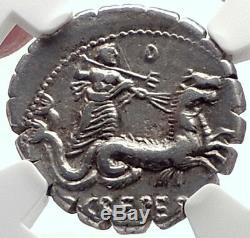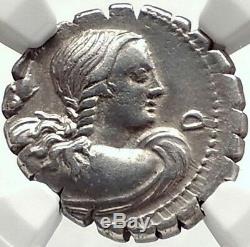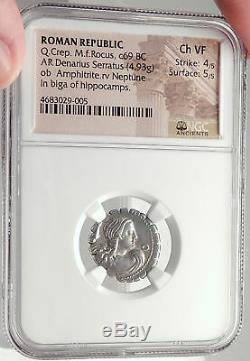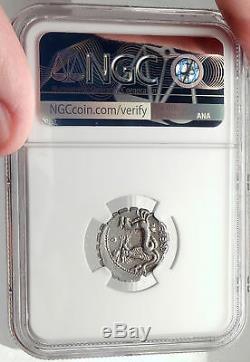
- Homepage
- Certification
- Composition
- Denomination
- Ae Prutah (34)
- Ae3 (14)
- Antoninianus (105)
- Ar Denarius (42)
- Aurelianianus (12)
- Aureus (146)
- Bi Double Denarius (24)
- Bi Nummus (22)
- Centenionalis (18)
- Cistophorus (24)
- Denarius (1293)
- Double Denarius (63)
- Dupondius (16)
- Nummus (122)
- Prutah (27)
- Quadrigatus (13)
- Sestertius (129)
- Siliqua (15)
- Solidus (171)
- Tetradrachm (22)
- Other (610)
- Era
- Grade
- Year
Roman Republic AMPHITRITE & NEPTUNE Authentic Ancient Silver Denarius Coin NGC






Creperius moneyer Silver Denarius 18mm (4.93 grams) Rome mint, struck circa 72 B. Certification: NGC Ancients Ch VF Strike: 4/5 Surface: 5/5 4683029-005 Draped bust of Amphitrite seen from behind, with head turned right; behind, dolphin; D in field to right. Neptune in biga of sea-horses right, holding reins and brandishing trident; above, D and below, Q·CREPEREI / ROCVS. Struck on a very heavy flan weighing about gram more than a standard one.
Provided with certificate of authenticity. CERTIFIED AUTHENTIC by Sergey Nechayev, PhD - Numismatic Expert. In ancient Greek mythology, Amphitrite was a sea goddess and wife of Poseidon and the queen of the sea. Under the influence of the Olympian pantheon, she became merely the consort of Poseidon and was further diminished by poets to a symbolic representation of the sea. In Roman mythology, the consort of Neptune, a comparatively minor figure, was Salacia, the goddess of saltwater.
Neptune and Amphitrite by Jacob de Gheyn II (latter 16th-century). The Roman Republic (Latin: Res Publica Romana) was the period of the ancient Roman civilization when the government operated as a republic.
It began with the overthrow of the Roman monarchy, traditionally dated around 509 BC, and its replacement by a government headed by two consuls, elected annually by the citizens and advised by a senate. A complex constitution gradually developed, centered on the principles of a separation of powers and checks and balances. Except in times of dire national emergency, public offices were limited to one year, so that, in theory at least, no single individual could dominate his fellow citizens.
Roman provinces on the eve of the assassination of Julius Caesar, 44 BC. The evolution of the Constitution of the Roman Republic was heavily influenced by the struggle between the patricians, Rome's land-holding aristocracy, who traced their ancestry back to the early history of the Roman kingdom, and the plebeians, the far more numerous citizen-commoners.Over time, the laws that gave patricians exclusive rights to Rome's highest offices were repealed or weakened, and a new aristocracy emerged from among the plebeian class. The leaders of the Republic developed a strong tradition and morality requiring public service and patronage in peace and war, making military and political success inextricably linked. During the first two centuries of its existence the Republic expanded through a combination of conquest and alliance, from central Italy to the entire Italian peninsula. By the following century it included North Africa, the Iberian Peninsula, Greece, and what is now southern France. Two centuries after that, towards the end of the 1st century BC, it included the rest of modern France, and much of the eastern Mediterranean.
By this time, despite the Republic's traditional and lawful constraints against any individual's acquisition of permanent political powers, Roman politics was dominated by a small number of Roman leaders, their uneasy alliances punctuated by a series of civil wars. The victor in one of these civil wars, Octavian, reformed the Republic as a Principate, with himself as Rome's "first citizen" (princeps). The Senate continued to sit and debate. Annual magistrates were elected as before, but final decisions on matters of policy, warfare, diplomacy and appointments were privileged to the princeps as "first among equals" later to be known as imperator due to the holding of imperium, from which the term emperor is derived. His powers were monarchic in all but name, and he held them for his lifetime, on behalf of the Senate and people of Rome. The Roman Republic was never restored, but neither was it abolished, so the exact date of the transition to the Roman Empire is a matter of interpretation. Historians have variously proposed the appointment of Julius Caesar as perpetual dictator in 44 BC, the defeat of Mark Antony at the Battle of Actium in 31 BC, and the Roman Senate's grant of extraordinary powers to Octavian under the first settlement and his adopting the title Augustus in 27 BC, as the defining event ending the Republic. Many of Rome's legal and legislative structures can still be observed throughout Europe and much of the world in modern nation states and international organizations. Latin, the language of the Romans, has influenced language across parts of Europe and the world. The item "Roman Republic AMPHITRITE & NEPTUNE Authentic Ancient Silver Denarius Coin NGC" is in sale since Wednesday, November 14, 2018. This item is in the category "Coins & Paper Money\Coins\ Ancient\Roman\ Republic (300 BC-27 BC)". The seller is "victoram" and is located in Forest Hills, New York. This item can be shipped worldwide.- Culture: Roman
- Material: Silver
- Certification Number: 4683029-005
- Certification: NGC
- Grade: Ch VF
- Composition: Silver
- Denomination: Denarius

